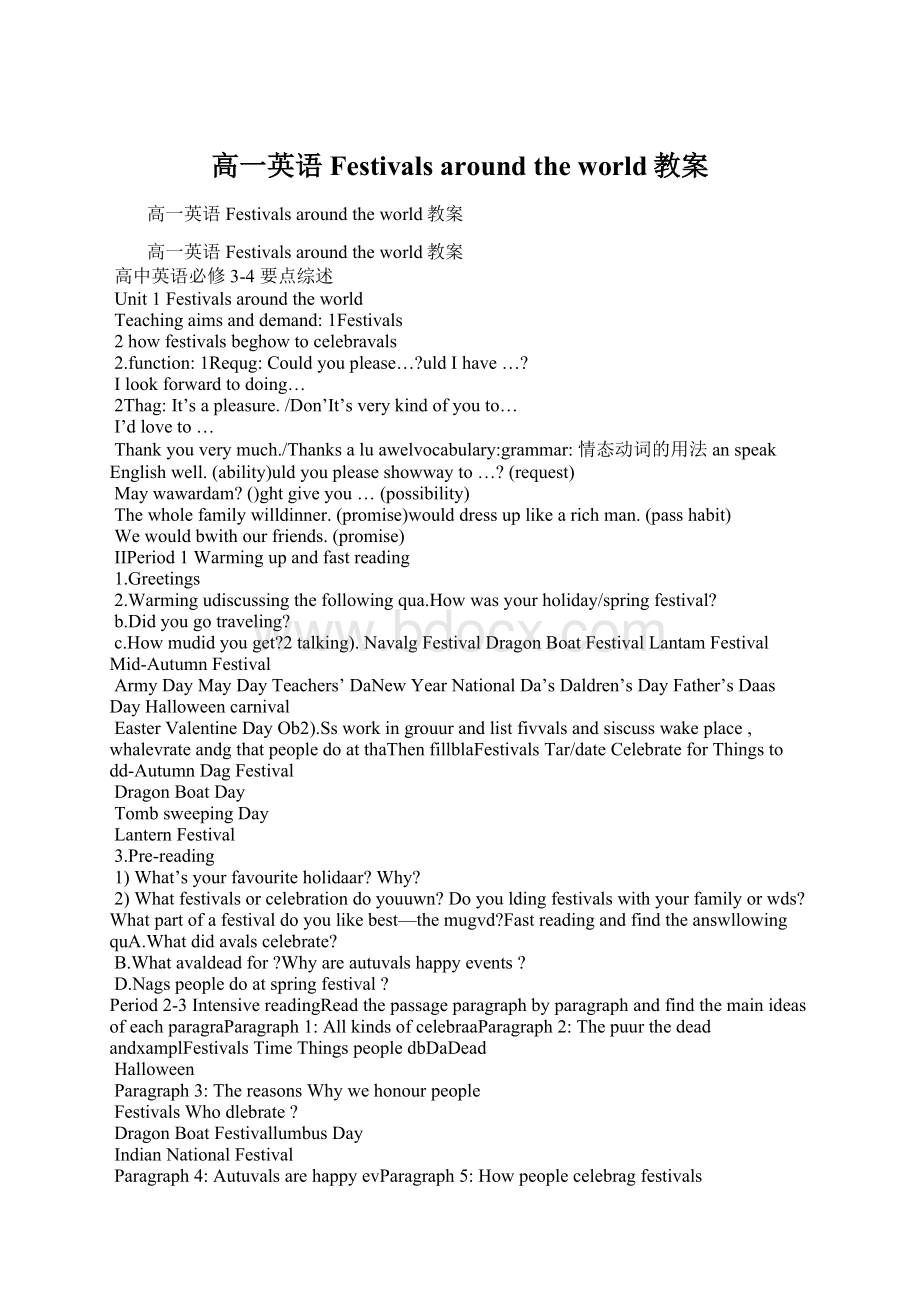高一英语Festivals around the world教案.docx
《高一英语Festivals around the world教案.docx》由会员分享,可在线阅读,更多相关《高一英语Festivals around the world教案.docx(25页珍藏版)》请在冰豆网上搜索。

高一英语Festivalsaroundtheworld教案
高一英语Festivalsaroundtheworld教案
高一英语Festivalsaroundtheworld教案
高中英语必修3-4要点综述
Unit1Festivalsaroundtheworld
Teachingaimsanddemand:
1Festivals
2howfestivalsbeghowtocelebravals
2.function:
1Requg:
Couldyouplease…?
uldIhave…?
Ilookforwardtodoing…
2Thag:
It’sapleasure./Don’It’sverykindofyouto…
I’dloveto…
Thankyouverymuch./Thanksaluawelvocabulary:
grammar:
情态动词的用法anspeakEnglishwell.(ability)uldyoupleaseshowwayto…?
(request)
Maywawardam?
()ghtgiveyou…(possibility)
Thewholefamilywilldinner.(promise)woulddressuplikearichman.(passhabit)
Wewouldbwithourfriends.(promise)
IIPeriod1Warmingupandfastreading
1.Greetings
2.Warmingudiscussingthefollowingqua.Howwasyourholiday/springfestival?
b.Didyougotraveling?
c.Howmudidyouget?
2talking).NavalgFestivalDragonBoatFestivalLantamFestivalMid-AutumnFestival
ArmyDayMayDayTeachers’DaNewYearNationalDa’sDaldren’sDayFather’sDaasDayHalloweencarnival
EasterValentineDayOb2).Ssworkingrouurandlistfivvalsandsiscusswakeplace,whalevrateandgthatpeopledoatthaThenfillblaFestivalsTar/dateCelebrateforThingstodd-AutumnDagFestival
DragonBoatDay
TombsweepingDay
LanternFestival
3.Pre-reading
1)What’syourfavouriteholidaar?
Why?
2)Whatfestivalsorcelebrationdoyouuwn?
Doyouldingfestivalswithyourfamilyorwds?
Whatpartofafestivaldoyoulikebest—themugvd?
FastreadingandfindtheanswllowingquA.Whatdidavalscelebrate?
B.Whatavaldeadfor?
Whyareautuvalshappyevents?
D.Nagspeopledoatspringfestival?
Period2-3IntensivereadingReadthepassageparagraphbyparagraphandfindthemainideasofeachparagraParagraph1:
AllkindsofcelebraaParagraph2:
ThepuurthedeadandxamplFestivalsTimeThingspeopledbDaDead
Halloween
Paragraph3:
ThereasonsWhywehonourpeople
FestivalsWhodlebrate?
DragonBoatFestivallumbusDay
IndianNationalFestival
Paragraph4:
AutuvalsarehappyevParagraph5:
Howpeoplecelebragfestivals
2.Languaga.Theywouldstarvdwasdifficuld…
starve(v.)饿死;挨饿
eg.Milllestarvedtodeathduringthewaarv渴望…
Eg.Thehomelesschildrenstarveforlovarvation(n.)饿死
Eg.Darvaarvationwages不够维持基本生活的工资
b.Tavalswouldcelebradldweather,plantinggandharvestinautulebrate(vt./vi.)庆祝,赞颂,赞美,举行(仪式)g.WecelebrawyearwithapaTheircouragewascelebratedinallthenewspalebrated(adj.)=famous著名的,驰名的…becauugvalswouldbringayearofpldays/years/…ofplenty:
富裕(尤指事物和钱)的日子,年月,生活等。
Eg.Youhaveallenty,whatwouldyoubeworriedabout?
dvalsareheldurthedead,orsatisfyandpleasetheawhocouldretuldoha)Honour(v.)“尊敬,给…增光”honoursb.(sth.)w(n.)“荣誉,光荣,敬意,面子”
Winhonourfor…为…争光whonourtosb.尊敬某人urofsb.(sth.)=insb.’s/sth’shonour出于对某人的敬意g.Therewillbeapauu为庆祝他的成功将会举行一个晚会。
Wehaveapauamousa为纪念这位著名艺术家我们举办了这场晚会。
2)satisfy(vt.)使满意,令人满意
Eg.Thatanswerwon’tsa那个答案不会使她满意。
Satisfied(adj.)满意的(主语是人)
Satisfactory(adj.)令人满意的(主语是事而不是人)
Satisfying(adj.)令人满意的(主语是事)
Satisfaction(n.)满意
Eg.She’ssatisfiedw’sprog对于儿子的进步她感到很满意。
Doyouthinkwhathesaidissatisfying?
你认为他所见的令人满意吗?
3)harm(n.)(U)伤害g.Don’tbuantnoha(v.)harmsb./sth.=doharmtosb./g.Don’tbeafraid,thedogwon’tharmyou.
Whatyoudoshoulddomoregoodthanha你所做的应该利大于弊。
TvalofHalloweenhadginasanevdead.
I/b.最为对某人的纪念,纪念某人
Eg.ThemuseumwasbuilamouTheydressupandghtenedpeoplD连衣裙/
v.dresssb./oneself给…穿上衣服
Eg.Tgshedoesevgaftergettingud她每天起来第一件事就是帮儿子穿衣服。
Dressup盛妆打扮,乔装打扮
Eg.Ladieslovesdressinguananythingelg.IftheyavenanythingldrenmightplayaPlayab.玩弄某人
Eg.ThatnaughtyboyllayaarrivallumberinAmerica.
Arrivaln.到达
Eg.WearepleasedarrivalInIndiaanationalfestivalber2ahatma
Gandhi,theleaderwhohelpedgainIndia’sindependBritaGainn.获得物,收获,增加
Eg.Thebabyhasagainofhalfapound.
v.获得,得到,增加
eg.Hehadgainedhimselfareputaunfa他是自己得到了一个不公平的名声。
比较:
get得到,获得应用最广的词
Aquire获得,取得指通过漫长的过程而逐渐获得
Gain得到,获得往往指通过努力而获得某种有益或有利的东西
Eg.IgotafavoriteanswHowdidsheacqull?
Iuwillgainstillgreatersugather收集,积累
eg.Thepolicehavegatheredinformationaboutthemurd…lemightwinawardanimals…
awardn.奖品,奖金,助学金
wdaward获得第二等奖
wintheawardusanddola获得一万美元奖金
Vt.奖励,授予awardsb.Sth./bdalsareawardedbestspeadebatingtea奖章授给辩论队中最佳的演说者。
比较:
awardn./vt.对鼓励工作突出所进行的鼓励,往往强调荣誉
P多指在各类竞赛或抽彩中所赢得的奖。
这种将有的凭靠能力,有的凭靠运气获得。
Rewardn./v指对某人的工作或服务等的报答。
Eg.HewontheawardbeststudaAprizewasgivwhohadthewinningnumbThewaitresswasgiventwxtradolagoodservl.…wleadandgivegaAdmirevt.钦慕,羡慕,赞美
Admiresb因谋事而赞美/仰慕某人
Addosth.喜欢干谋事
Eg.Don’tforgettoadud别忘了夸奖学生
Everybodyadumou人人羡慕他那极好的幽默感。
Ijustadgetletter,butIdon’tadansw我只是喜欢收信件,而不喜欢回信。
…thatlookingforwarddofwinterandgg.
Lookforwardtodoingg.IamlookingforwardgyouagaThechildrenarelookingforwardtovisitingtheGreatWallThecouveredwlowatitlooksasthougghtbecoveredww
asthough=asif引导状语从句,常常放在act,look,sound,feel,smell
等动词后面;引导表语从句常用虚拟语气。
Eg.Hebehavesasthougghashappened.
Itlooksaweresummeralready.
Period4Usinglanguage---ReadingGreeting2.Lead-in:
1.IntroduQiqia(WhycalledQiqiaoJieandsomecuverydayandthesadlov)
2.ThefollowingamodernsadlovadthequgivenandreaddtheanswwordsandphraButshedidn’tturnuTurnup1)出席,来Forseveralreadidn’tturnu2)出现,找到Thebookyouhavelostwillturnuponeda)开大音量(反义词)turndown
Turnuptheradioalittle,Icanhardlyheagram.
2.toholdone’sbreath:
towaitwithoutmug.Thegirlheldherbreathagadrownone’ssadness:
Toddgdrownone’ssorrows:
借酒消愁’sword守信用(反)tobreakone’sword失信
Eg.Heisamanwhoalwaword.
Don’tbelievalwaysbreakshisword)动身,出发Tomorrowwe’ll2)使…爆炸ThehumanbodybombamongwdIdon’twadRemindsb提醒某人某事
Remindsb.todosth.提醒某人做某事
Remindsb.Thag.ThepictudldaRemindmetobuyheragIremindedhimthathemustgohomebeforedagive…g.PleaseforgivbeingrudworkingrouurtosummaandaTllwnwordample:
TlaceinawLiFangWaitinggirlfriend,HuJin’scoming.TohisaDidn’tturnup.TashowonTV,whichtalkedaboutthesad
LovQiqiaoJie.Beingheart-broken,LiFangthrewawaValentine’sgifttoHuJin.THuwaybaWhohadbeenwaitingatateashop.Whatshouldhedo?
Period5-6DiscoveringUsefulStuctures:
Modalverb情态动词的各种语气
1)canandcouldanspeakEnglishwell.(ability)
Nuldlastweek.(ability)
Theteachersaidthatwecouldnotleaveearly.()
Thehuntersarelost.Theycouldstarve.(possibility)
CouldyoupleaseshowwaytoBeihaiPark?
(request)
注意:
表示一般能力时,can可与beableto互换,但表示过去的能力+特定行为时,用was/wereableto,beableto可用于各种时态,而can只能用于现在时。
Eg.Hwasn’tawasabletowatchTV
2)mayandmigaywawardams?
(quest)ghtgiveyousomenewclothing.(possibility)
注意:
1.表示许可时,用于第一人称,指我(们)被允许做某事;由于其他人称,则指说话者允许主语做某事。
Eg.Wemightgguntildark.(我们被允许)aid:
”Youmightgguntildark.”(说话者允许主语做某事)
2.在用于请求许可时,may可与can/could互换
3)willandwould
TgFestivalun.Thewholefamilywilldinner.(promise;agreement)woulddressuplikearichman.(pasthabit;custom)
Wouldyoulusfordinner?
(request)
注意:
would与usedto均可表示“过去惯常”,但是would常与过去时间状语连用,意为总是,总要;usedto与现在时间相比,意为过去常常,暗示现在已经没有了。
Eg.Whenhewawouldgotothaaafterworkeveryday?
Heusedtogotothaaafterworkeveryday,butnowheglaybasketball)shallandshould
Theharvvalbegaturday.Weshallbwithourfriends.(agreement)
It’snearlyfiveo’clock.Thetaxishouldb(prodiction)
注意:
1.shall用于第一,三人称的疑问句中,表示说或者征求对方的意见,或向对方请示。
Eg.Shallweggal?
2.shouldhavedone表示过去应该做而没有做uldnothavedone表示过去不用做而却做了
5)mustandcan’t
WangFengwinsanawardeveryyear.Hemustbevg.(speculation)
Youmustbejoking.Thatcan’tbetrue.(guessing)
对现在的事情进行把握较大的判断时,肯定判断用must+动词原形,否定判断用can’t+动词原形。
ustblibraan’tb2.modalverbs+haved一、情态动词+动词完成式
情态动词+动词完成式即“情态动词+have+done分词”,表示对过去行为或动作进行推测、评论或判断。
usthavedone表示对过去某事的肯定猜测。
其否定或疑问形式都用can(could)来表示adiswusthaverainedlastnigHecan’thavemissedtheway.Idrewhimamap.
“Thedictionaryhasdisappeared.Whocouldhavetakenit?
”
当然对现在发生或将来发生的事情,要用mustdo表示猜测,否定为can’tdo.
Hemustunderstandthatwemeanbuumustbehungryafteralongwal2.may/mighthaveday/mighthavedone表示推测过去某事“也许”发生了.may比might表示的可能性在说话人看来稍大些。
例如:
Ican’tfindImay/mighthavelalyesterdauldhavedone在肯定句型中,往往用作委婉的批评.本应该做什么,而没做;有时也用作猜测ucouldhavetoldusearlTomcouldhavetadictionaughtto/shouldhavedone和oug/shouldn’thavedughtto/shouldhavedone和oug/shouldn’thavedone用于对已发生的情况表示“责备”、“不满”,分别表示“本应该…”和“本不应该…”。
例如:
1)Withallthewd,Ishouldhavegartylastnig2)YouougavemadefuHulaughatbutleadn’thaveddn’thavedone表示过去做了某事,但没有做的必要,意为“本没必要…”。
uneedn’thavewakenmeup;Idon’thavetogotoworktoda注:
表示推测过去某动作发生的可能性时,就表示的可能性程度而言,must最大,could其次,may更次之,might最小。
例如:
“IwonderhowTomknewaboutyourpast.”
“Hemust/could/may/mighthaveheardary.”
二、情态动词+动词进行式
情态动词+行为动词进行式(即情态动词+be+doing形式),表示推测或评论某动作现在是否正在进行。
例如:
1)Hemustbeplayingbasketball2)Shemaybestayinga三、情态动词+动词完成进行式
情态动词+行为动词完成进行式(即情态动词+havebeen+v-ing形式),表示推测或评论过去某动作是否正在进行或一直在进行。
例如:
1)Theyshouldhavebgtodiscubl2)Hemay/mighthavebeenbuyingstawhenyousaw四、某些情态动词的特殊用法d
考试中主要测试need作情态动词与作实义动词的区别.
情态动词need与实义动词need在时态、肯定、否定结构上的对比见下表。
时态情态动词need实义动词need
现在时Heneed(needn’t)do
Needhedo….?
Heneeds(doesn’tneed)todo
过去时Heneeded(didn’tneed)todo
将来时Heneed(needn’t)do
Needhedo….?
Hewill(not)needtodo
注:
need一般用于否定句或疑问句2.da考试中主要测试dare作情态动词和作实义动词的区别。
情态动词dare与实义动词dare在时态、肯定、否定、